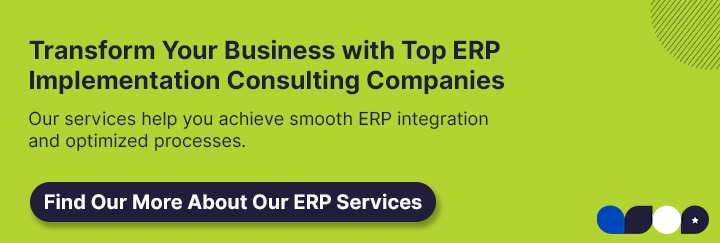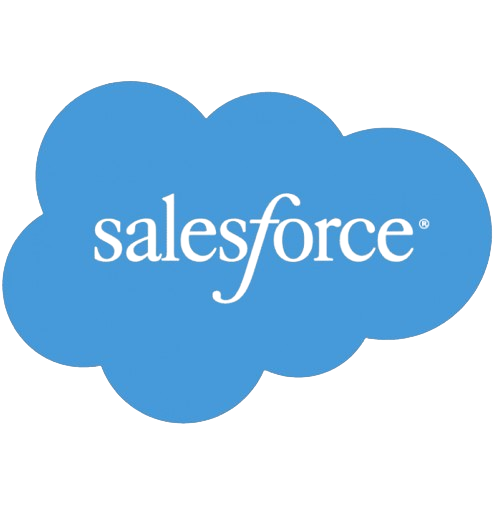ERP Implementation Consulting Services: Best Providers & Benefits for 2025/2026
Updated on February 19, 2026
Navigating the ERP (Enterprise Resource Planning) implementation landscape can be a complex journey that demands expertise, patience, and a deep understanding of business processes. Whether you’re a large enterprise or a growing business, choosing the right ERP implementation consultant is crucial to ensure your systems integrate smoothly, function effectively, and ultimately help your business thrive. This blog explores what ERP implementation involves, highlights the typical characteristics of the best ERP consultants, and showcases seven of the best ERP implementation consultants for 2025/2026, including industry leaders like Cloud Consulting Inc. Inc., Infosys, and Accenture.
What is ERP Implementation?
ERP implementation is deploying ERP software to manage and automate various business functions, such as finance, human resources, supply chain, and customer relationship management. This process involves several stages: planning, configuration, data migration, testing, training, and go-live. Best ERP systems are designed to centralize data, organize workflows, and improve organizational decision-making. However, the success of an ERP implementation heavily depends on the expertise and approach of the consultants leading the project.
Read Related Blog: Top ERP Implementation & Consulting Companies 2025
Common Characteristics of the Best ERP Implementation Consultants
Choosing an ERP implementation consultant is not just about selecting someone who knows the software; it’s about finding a partner who understands your business needs, communicates effectively, and can guide you through the entire implementation process. Here are some common characteristics of the best ERP implementation consultants:
-
Experience Across Industries
The best consultants have experience working with a variety of industries. This broad exposure allows them to understand unique business challenges and provide solutions that align with industry standards.
-
Strong Project Management Skills
Successful ERP implementation requires meticulous planning, coordination, and management. Top consultants excel in these areas, ensuring the project stays on track and within budget.
-
Technical Expertise
Understanding the technical aspects of ERP software is crucial. The best consultants know how to configure the software, integrate it with existing systems, and customize it to meet specific business needs.
-
Communication and Collaboration
Effective communication is critical to a successful ERP implementation. Top consultants work closely with your team, providing clear updates and ensuring everyone is aligned with the project goals.
-
Focus on Training and Support
The best consultants don’t just leave after the software is live. They ensure your team is trained to use the new system and provide ongoing support to address any issues.
7 Best ERP Implementation Consultants in 2025-2026:
1. Cloud Consulting Inc. (CCI)
Cloud Consulting Inc. (CCI) is a leading ERP implementation consultant known for its deep expertise and personalized approach to each project. CCI understands that every business has unique needs and challenges, and we work closely with our clients to ensure that the ERP solution implemented aligns perfectly with their specific requirements. We offer comprehensive ERP services, from initial consultation and planning to post-implementation support.
Benefits:
One significant advantage of working with CCI is our focus on creating customized ERP solutions that are easy to use and highly effective. We follow the latest ERP trends and ensure the ERP system integrates smoothly with existing processes, improving efficiency and decision-making. CCI is also known for exceptional customer service, providing ongoing support and ensuring our clients are delighted with the ERP system.
Drawbacks:
While CCI’s personalized approach is highly beneficial, it can also mean that our services are more suited to businesses looking for a customized solution rather than a one-size-fits-all package. This might make CCI less ideal for companies looking for a quick, out-of-the-box implementation.
Industries Catered To:
ERP Services Offered by CCI:
- ERP Professional Services
- ServiceNow Professional Services
- ServiceNow ITSM Services
- Snowflake Professional Services
- SAP Professional Services
- SAP Consulting Services
- Rise with SAP
- Mulesoft Professional Services
2. Infosys
Infosys is a global consulting giant with a strong reputation for delivering effective ERP solutions. Their ERP implementation services are designed to help businesses optimize their processes, reduce costs, and improve overall productivity. Infosys leverages its vast experience and excellent technology to provide solutions that drive business transformation.
Benefits:
Infosys’s strength lies in its extensive global experience and ability to deliver large-scale ERP implementations. Its efficient methodology ensures projects are completed on time and within budget. Infosys also offers comprehensive support services, ensuring that clients have the help they need throughout the ERP lifecycle.
Drawbacks:
One potential drawback of working with Infosys is that their services might be more expensive than those of smaller, niche consultants. Additionally, their size and scope can sometimes lead to a less personalized experience for clients.
Industries Catered To:
- Financial services
- Retail
- Healthcare
- Manufacturing
- Energy
3. Accenture
Accenture is another global leader in ERP implementation consulting. They offer end-to-end ERP services that help businesses smoothen operations and improve efficiency. Accenture’s highly strategic approach ensures that the ERP solution aligns with the company’s long-term business goals.
Benefits:
Accenture is known for its strategic approach to ERP implementation. It focuses not only on the technical aspects but also on how the ERP system can drive business growth and transformation. Accenture’s global presence and vast resources mean that it can handle even the most complex ERP projects.
Drawbacks:
Like Infosys, Accenture’s services can be more expensive, and their large size may result in a less personalized experience for some clients. Additionally, their strategic approach might not suit companies looking for a quick implementation.
Industries Catered To:
- Finance
- Healthcare
- Retail
- Manufacturing
- Public services
4. SAP America Consulting
SAP America Consulting is part of SAP, the company behind one of the world’s leading ERP systems. They offer many services, including ERP implementation, to help businesses make the most of SAP’s powerful software. SAP America Consulting is known for its deep expertise in SAP products and ability to deliver effective ERP solutions.
Benefits:
The biggest advantage of working with SAP America Consulting is their deep knowledge of SAP’s ERP software. They are experts in configuring and customizing SAP solutions to meet their clients’ specific needs. SAP America Consulting provides comprehensive support, ensuring businesses can fully leverage their ERP system.
Drawbacks:
SAP America Consulting’s highly specialized services focus primarily on SAP products. This might not be ideal for businesses looking for a more flexible ERP solution.
Industries Catered To:
- Finance
- Healthcare
- Manufacturing
- Retail
5. TATA Consulting Services (TCS)
Tata Consulting Services (TCS) is a global consulting firm that delivers effective ERP solutions. Their ERP implementation services are designed to help businesses increase the efficiency of their operations, reduce costs, and improve overall efficiency. TCS combines deep industry knowledge with technical expertise to deliver ERP solutions that drive business transformation.
Benefits:
TCS’s strength lies in its ability to efficiently deliver large-scale ERP implementations. Its methodology ensures projects are completed on time and within budget. TCS also offers comprehensive support services, ensuring that clients have the help they need throughout the ERP lifecycle.
Drawbacks:
TCS is that their services might be more expensive than those of smaller, niche consultants. Additionally, their large size can sometimes lead to a less personalized experience for clients.
Industries Catered To:
TCS serves various industries, including financial services, retail, healthcare, manufacturing, and energy. Their broad industry expertise allows them to deliver ERP solutions that address specific industry challenges.
- Finance
- Retail
- Healthcare
- Manufacturing
- Energy
6. Oracle Consulting
Oracle Consulting is Oracle’s consulting arm and one of the leading ERP software providers. It offers comprehensive ERP implementation services designed to help businesses optimize their processes and improve overall efficiency. Oracle Consulting is known for its deep expertise in Oracle’s ERP products and its ability to deliver effective ERP solutions.
Benefits:
Oracle Consulting’s most significant advantage is its deep knowledge of Oracle’s ERP software. They are experts in configuring and customizing Oracle solutions to meet their clients’ specific needs. Oracle Consulting also provides comprehensive support, ensuring businesses can fully utilize their ERP system.
Drawbacks:
Oracle Consulting’s services are highly specialized, focusing primarily on Oracle products. This might not be ideal for businesses looking for a more flexible ERP solution.
Industries Catered To:
- Finance
- Healthcare
- Manufacturing
- Retail
7. Acumatica
It offers a range of ERP implementation services designed to help businesses improve their operations and grow. Acumatica is known for its flexible ERP solutions, which can be customized to meet each business’s unique needs.
Benefits:
Acumatica’s most significant advantage is its flexible, cloud-based ERP solutions. This makes their ERP systems highly adaptable to the needs of businesses across various industries. Acumatica also offers firm support services, ensuring clients can fully leverage their ERP system.
Drawbacks:
One drawback of working with Acumatica is that their solutions require more customization, which can increase the time and cost of implementation.
Industries Catered To:
- Finance
- Retail
- Manufacturing
Conclusion
Choosing the right ERP implementation consultant is a critical decision that can significantly impact the success of your ERP project. Whether you’re looking for a personalized approach like that offered by Cloud Consulting Inc. Inc. or a more strategic, large-scale implementation from companies like Infosys or Accenture, many excellent consultants are available to meet your needs in 2025/2026. By considering the specific characteristics of each consultant and how they align with your business needs, you can make an informed decision that will set your company up for success.
FAQs: Best ERP Implementation Consultants
Q1: What is the role of an ERP implementation consultant?
An ERP implementation consultant helps businesses plan, configure, and deploy ERP software. They provide expertise in both the technical and business aspects of the implementation, ensuring that the ERP system meets the company’s needs and is integrated effectively with existing processes.
Q2: How long does an ERP implementation take?
The duration of an ERP implementation can vary depending on the size of the business, the complexity of the ERP system, and the scope of the project. On average, ERP implementations can take anywhere from several months to over a year.
Q3: What are the costs associated with ERP implementation?
Costs for ERP implementation can vary widely depending on factors such as the ERP software chosen, the level of customization required, and the size of the business. Costs typically include software licensing, consulting fees, and any hardware or additional software needed for the implementation.
Q4: Can ERP systems be customized to meet specific business needs?
Yes, most ERP systems can be customized to meet the specific needs of a business. This can include customizing the software to align with existing business processes, integrating it with other systems, and adding specific functionalities required by the business.
Q5: What industries benefit most from ERP systems?
ERP systems are beneficial for a wide range of industries, including manufacturing, finance, healthcare, retail, and services. Any industry that requires centralized data management, process automation, and improved decision-making can benefit from an ERP system.







